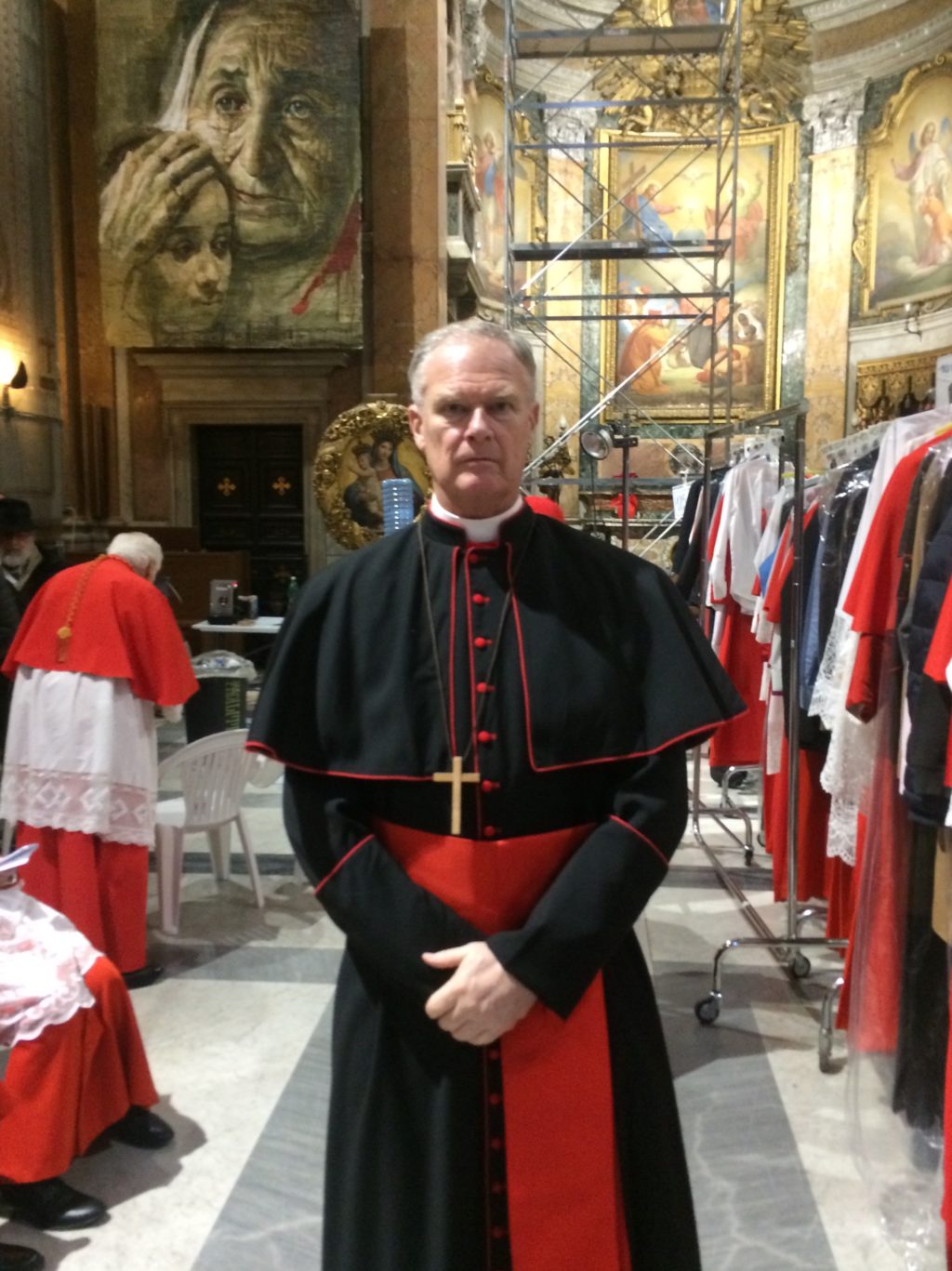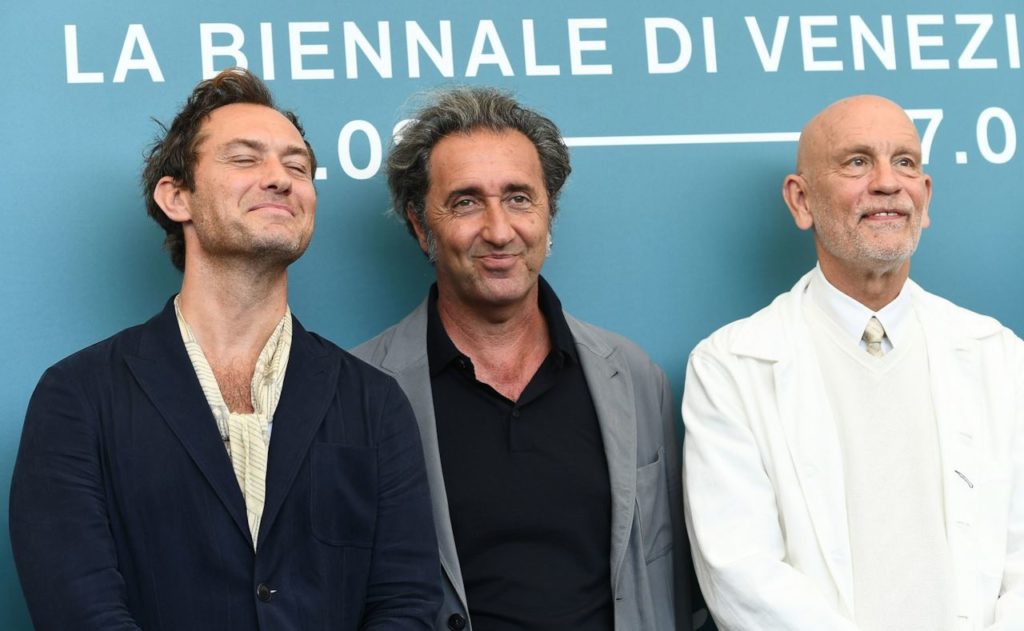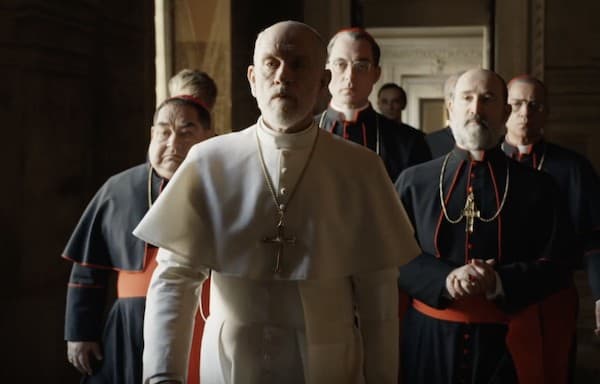“The New Pope” a holy new experience for this film extra as an American cardinal

Eighty cardinals stared at me as I walked alone down the Sistine Chapel. I tried not to think about Oscar-winning director Paolo Sorrentino watching my every step or the two cameras I was told not to look at or I’d be shot on sight. Instead, I walked slowly, deliberately, as if in a trance, hoping the ballot I held aloft didn’t fall from my hand that shook from walking a universe outside my comfort zone.
I approached a table and stared down at a silver ballot bowl. Atop it was a small card with my first lines I ever uttered as a movie extra. They were words I’d never seen before that day. They were almost unpronounceable. I had no earthly idea what they meant. The card looked more like a bottomless abyss into which I was about to fall, much to the amusement of 80 cardinals and the disgust of one of the world’s greatest directors.
A movie extra, known as a comparsa in Italian, doesn’t get many opportunities to stand out. We’re in the background. We fill in the gaps, the crowds. The only seats in movies we fill are the ones we’re in. We’re human furniture, easily movable and more easily replaced.
We are not actors. Actors have talent. We have none. Yet you can’t make a movie without us and on that day last February, Sorrentino needed me to speak. In a foreign language. And not the Italian that I’ve spent the last six years in Rome learning.
Malkovich replaces Law
I was in the middle of shooting “The New Pope,” starring John Malkovich. It’s HBO’s sequel to the successful first series from 2016, “The Young Pope,” starring Jude Law playing a New Jersey street kid who grows up to be the youngest pope in history. As in the first series I blogged about three years ago, I play an American cardinal.
I dress up in long red or black cardinal robe. I walk in slow processions. I pray. Being a film extra is a little like being in a war. It’s long, boring waits interspersed with brief bits of action and sometimes, in my case, sheer, unabashed terror. The only difference is I carried a cross instead of a gun.
For a month, I woke at 4 or 5 in the morning and took the bus and subway to Cinecitta, Rome’s gritty, legendary film studio that produced many of the old American westerns. Or I’d hop a bus and head to Palazzo Venezia where Benito Mussolini stood on its balcony and revved up his fellow fascists into a frothing rage.

Again, I had the great pleasure of working with Paolo Sorrentino. There are classically trained, working-class actors practicing their accents while driving a cab in L.A. who would swim to Rome to work with Paolo Sorrentino. I got picked out of an Internations Meetup group lineup and hopped a bus.
Sorrentino, 49, has the rare ability to be intense yet friendly. He had deep conversations with Malkovich or veteran Italian actor Silvio Orlando but he always made all of us feel as if we were part of something special. That’s not easy with 80 old men from around the world dressed like Vatican lifers. I never felt like furniture.
He always looked disheveled, as if he slept in the Vatican Gardens. His dress belied the Italian fashion standard of La Bella Figura. I think he subscribed to Homeless Quarterly.
“The Young Pope” won Venice award
He is huge in Italy. He is keeping the flickering flame of Italian cinema from going out. He won the 2014 Oscar for Best Foreign Film with “The Great Beauty,” and the underrated “The Young Pope” won the Rotella Award at the 2016 Venice Film Festival.
Some of his scenes are weird. I still can’t figure out what the hell role the ancient nun played in “The Great Beauty.” But the film showed a soft underbelly of Rome’s La Dolce Vita I’ve tried and maybe failed to do in my travel blog. “The Young Pope” exposed the Catholic Church’s warts much worse than the Vatican feared when it refused to cooperate with the series in any way.
We had no idea what “The New Pope” was about. Not wanting to expose the plot too soon, Sorrentino made a point not to tell us extras the meaning of any scene. I even waited until the series began on Sky Italia Jan. 13 and HBO in the U.S. Jan. 16 before writing this blog.
If you haven’t seen the first two episodes (shown Friday nights on Sky Italia and Monday nights on HBO), what has been exposed is it picks up where “The Young Pope” left off with Law’s pope character laying in a coma. We cardinals meet in the “Sistine Chapel” to vote on a new pope which turns out to be Don Tomasso Viglietti, played by Italian actor Marcello Romolo. He becomes Enemy No. 1 when one of his first acts is to let a mass of refugees seek shelter in the Vatican and denounce all the church’s riches and the cardinals’ possessions.
However, he soon dies of a mysterious and convenient heart attack, similar to Pope John Paul I who lasted only 33 days (and, ahem, whose coronation I attended as a 22-year-old backpacker passing through Rome in 1978), the truth of which remains a mystery to this day (I deny any involvement. I carried a panino in my backpack, not poison).

With Viglietti out the Vatican, in a hurry, turns to one Sir John Brannox, a wealthy English priest haunted by childhood memories of his now invalid parents favoring his twin brother whose death they blame on Brannox. Malkovich plays Brannox and his versatility comes through even more up close. Whether he played a manic war photographer in “The Killing Fields,” a quasi-alcoholic CIA operative in “Burn After Reading” or a subdued, deep-thinking pope, Malkovich has a conviction that steals every scene.
By the time we finished shooting, I thought he was the pope.
But he didn’t get my vote. I voted for Cardinal Angelo Voiello, played by Italian actor Silvio Orlando. Little did I know who one of his competitions was.
Me.
All 80 of us were sitting in the makeshift Sistine Chapel voting for the next pope. We all wrote down a name, with me covering the paper with my entire arm to keep it private. Soon, one of the three men at the desk in front pulled cards out of the ballot box and handed them to another who read them. Then he tallied them.
“Sabatini one vote,” he said. “Pavroski one vote. Henderson two votes.”
Say what?
HENDERSON? I got two votes to be pope? I hadn’t been to church since the eighth grade and I got two votes to head the entire Catholic world? Who knew? Maybe I should call those Catholic girls who blew me off in college. Maybe they’ll change their minds.
Sorrentino then led a cameraman to me and told him, “That’s Henderson.” They told us the next day they’d shoot our reaction. I wasn’t going to win. I went home practicing a good frown.
The next day came my “big break.” It was my one line, one I had no idea I’d mutter until I took my usual seat on set. Sorrentino named about six cardinals, including me. I followed assistant director Davide Bertoni to the ballot bowl where he asked me to read the message. It was in Latin, a Latin prayer. The only words I know in Latin are “In Vino Veritas (In wine is truth)” because that’s written on my refrigerator magnet. I stumbled through the prayer and he surprised me by saying, “Buono.” He told me when my name is called, carry my ballot to the box, read the prayer and drop it into the opening.

I went back to my seat trying to remember the message. At 63, I can barely remember my PIN number let alone a Latin prayer. Near me sat Emmanuel Dabone, a professional actor from the Ivory Coast who speaks excellent English. He gave me a tip. Remember just the first three words. Those are the most difficult. Read those then take my time reading the rest.
I had no time to be nervous. Maurizio Lombardi, a tall, very nice Italian actor who plays a gay cardinal, was the first called. He nailed it. He even sounded like a real priest schooled in Latin. I then heard Sorrentino yell, “Henderson!” I had to follow a pro Italian actor? I felt like the dog act after Robert De Niro on “The Tonight Show.
I got up, walked into the middle of the silent makeshift chapel and strolled slowly to the table, hoping I didn’t kick the camera I wasn’t supposed to look at on the ground. I read the words. Shockingly, I, whose quest to learn Italian was the biggest challenge of my life, did it. I didn’t stumble once. I didn’t sound Italian. I sounded like an American trying to speak Latin. That was what they wanted.
The problem was I had to put my ballot on the bowl cover, tip the cover and pour my ballot into the bowl.
I missed.
It went off to the side. I picked it up and dunked it like a basketball. Davide, maybe the nicest guy on the set, said, “Good! Good! Don’t worry about the ballot. But next time that happens, just say, ‘Fuck!’”
An actor’s approval
He was smiling. I walked back to my seat and Emmanuel held out a fist for me to bump. My line wasn’t exactly the “This sceptred isle” speech from “Richard III” but for a guy who never for one microsecond ever fantasized about being an actor this was truly surreal.
It was just one of numerous scenes I would be at center stage. In “The Young Pope,” I was in Episode 1 Scene 1 and never seen again. In “The Next Pope,” Sorrentino actually knew who I was. I felt like a rookie free agent punter whose name Bill Belichick calls.
Early in the shooting, we were called to Rome’s Botanical Gardens, just down the hill from my apartment in Trastevere, the one-time bohemian neighborhood that has gentrified into party central. The gardens are a reasonable facsimile of the Vatican Gardens the Vatican brass refused to let us near.
We were outside a building when Sorrentino took me by the arm and brought me to the front.
“OK, I want you to pray,” he told me. “Get on your knees.” Then he demonstrated, with his hands clasped in prayer and his eyes closed tight.
“With my eyes closed?” I asked.
“Yes. You just saw a miracle.”

Wait a minute. Did I just get acting instruction from an Oscar-winning director? I did. I needed it. I’d never prayed in my life. This was definitely acting.
I got on my knees and felt very much alone. To my right was a camera and a bevy of studio workers. They stared at me. At “ACTION!” I put my hands up and closed my eyes as hard as I could. My eyeballs hurt. I didn’t dare open my eyes and, of course, they didn’t let us in on the plot. I sensed that the camera went through the building where many of the cardinals and some Franciscan monks prayed. We did three scenes and Paolo emerged from the building.
“Finito,” he said and gave me a thumb’s up. My praying passed.
Sorrentino surprised me again later. All the cardinals were in Palazzo Venezia, a beautiful brick building built in 1464 with huge, ballrooms and a long, eerily dark hallway leading to Mussolini’s balcony. We were all told to clap as Malkovich walked in as the pope.
Sorrentino grabbed me and took me over to a dolly. A muscular props guy helped me get one giant step on top. Sorrentinto told me when Malkovich walks in the room, “Wave like this,” he said, waving his arm like a giant wiper blade.
I had no idea why I was doing this. As an extra, you don’t ask questions. You do what you’re told and stay quiet. So Malkovich walked in and the props guy slowly wheeled me back on the dolly. I waved at Malkovich like a sailor trying to get my wife’s attention as I sail off to sea. I smiled wider than the Joker. Later, someone told me it’s part of a dream scene.
Whatever, when we finished, Sorrentino walked by, gave me the thumbs up and said, “Hai fatto bene (You did well.)” I looked over at all the cardinals. They were staring at me.
Cardinal envy, no doubt.

These moments of high personal intensity, however, are like rays of sunshine during a cold winter in the Iron Belt. Most of the time life as an extra, as I blogged in May, is standing around. It’s waiting for 80 cardinals to get dressed or the next scene to be shot. I usually brought a Corriere dello Sport to read up on my AS Roma.
In this modern age when selfie sticks and cell cameras have turned narcissism into an art form, many killed time by taking photos. Many didn’t get the word. I was told studios around the world were cracking down on it, in fear that future plots would be revealed. One learned person on set said “House of Thrones” had fired numerous people, including two who’d worked the show for seven years.
“Walked them right off the set,” she said.
Yet despite warnings, I saw more pictures taken between takes than tourists in front of Trevi Fountain. As you can tell by the photos in this blog, I didn’t take many.
The studio even cracked down on tourists’ photos. When 80 cardinals leave Palazzo Venezia, one of Rome’s biggest tourist attractions, it’s almost like the pope leaving. I bet I’m in about 200 laptop file folders in Japan right now. One time as we left the palace, an assistant screamed at a mob of tourists to stop taking our picture. One man, with a very expensive camera and the movements of a paparazzi, kept shooting, ignoring her every word. As we crossed the street, I slipped out of character of a Vatican holy man — just a bit — and yelled, in full cardinal robe, “ARE YOU DEAF ASSHOLE?! FUCK YOU!”
I imagine he knew then I wasn’t really a cardinal.
Getting discovered
Sometimes people just slept. Remember, cardinals are old. In an early take in the Botanical Gardens, we found ourselves outside for three hours without a single thing to do. I forgot to bring a newspaper. My cell battery had died. All I could do was look at two extras playing policemen nodding off, their heads leaning against their hands in exactly the same manner. It almost looked posed. Three cardinals were snoring.
I was about to nod off when I took a stroll and ran into the young chocolate brown-robed Franciscan monks, all in their 20s. They were smoking. One named Giorgio grew up going to American schools and worked and studied in Dubai for six years. He spoke perfect English. I asked how comfortable the robes were. It was sunny but chilly, in the low 50s.
“It’s all we’re wearing,” he said. “We have underwear. That’s it. (The chill) is coming up from everywhere.”
It’s interesting how we all got discovered. Studio recruiters found Giorgio in a nightclub in San Giovanni, the university neighborhood behind Termini train station. An attractive woman asked to take his picture. Sure, he said. He gathered all his friends.
“No. Just you,” she said.
“OK. But why me?”
“We’re shooting a film and we want some fresh faces.”
Another guy, frail and in his 30s was also spotted in a nightclub. Another was found in Centro Storico eating gelato.
Hey, Mel Gibson was discovered when a director liked his rugged face covered in bruises from a bar fight the night before.
Not that I have any aspirations to parlay this into a career. Some extras have. In fact, veterans tell me they watch movies just to see who they know and worked with in the background.

It’s a thrill enough to see me appear on my own TV. It’s like an out-of-body experience to lock into a drama as you would any other night then suddenly your own face appears on screen. In Episode 1 I’m shown about five times. I see my head bowed as I read my Latin prayer. Only a few words are heard. I see myself picking up my ring in Episode 2. In Episode 4 there’s even a closeup of me listening intently to Malkovich giving us a lecture about the church’s new intolerance of pedophilia.
And at the end of Episode 1, I’m even listed in the credits. But, alas, I’m listed as John Henderson Howard. They juxtaposed my middle and last names. It’s probably a result of how a colossal identification screw-up with the city requires me now to use all three names as my legal name.
I’ll forgive the studio. I’m the forgiving type. After all, I did get two votes to be pope.


January 23, 2020 @ 11:47 pm
John Howard! – great post, and you look the part; sono molto invidioso!